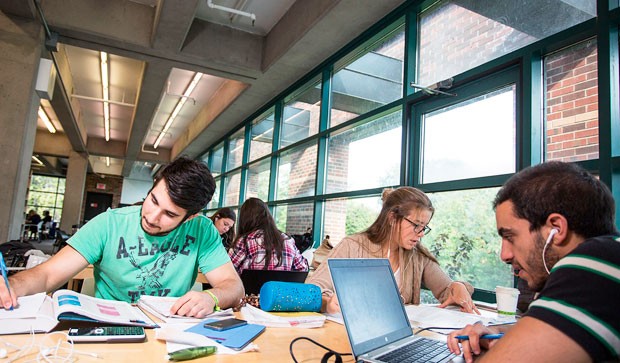Learn how to study like a pro

“Many students think that memorization is the best way to study,” says Jennifer Banton, a learning specialist with Concordia’s Student Success Centre.
“But university’s not about regurgitating information; it’s about understanding, applying and storing it so that it can be built on.”
Banton calls strategies like rote memorization and cramming “passive learning,” and warns that they often fail students in university – even if they were useful in high school or CEGEP.
Passive learning, she says, makes it more difficult for you to retain information. “Instead, use active learning strategies to put information into your long-term memory so that you can engage it later on.”
Banton suggests these active learning strategies for improving your study skills:
Practice active reading
1. Preview the text
“Read the introduction and the conclusion first,” says Banton. “Academic texts are not mystery novels; the end isn’t supposed to be a surprise.”
Previewing prepares you for what’s in store, she explains. It helps you recognize the most important elements in the text and understand how things fit into the bigger picture. Go through the conclusion, then check out the table of contents, summary, intro, and any headings or words in bold print. Read the first couple of sentences under each heading.
“This should take about 15 minutes,” Banton says. “If you have time for nothing else before a class, at least do a preview.”
2. Ask questions
What does the author want me to know? Why did he or she choose these headings? What is the main argument or point of the text or the section? How does it fit into the bigger picture? What does the professor want me to know? What do I want to learn?
“With questions like these in mind, you actively seek out answers in the text, meaning you are far more engaged in the reading,” says Banton.
3. Read selectively
Previewing the text and forming relevant questions will help you identify key sections. Be selective with your reading.
“You do not have to read every word” says Banton. “Some anecdotes, graphics and paragraphs aren’t as important as others. If it doesn’t relate to the bigger picture, skip it. Because you have done a preview of the text, you can make informed decisions about what is key information and what is not.”
4. Summarize what you’ve learned
Try repeating the key points to yourself without flipping back through the text. Write down the key words and phrases for each section. Summarize what you’ve learned, but do it in your own words – copying the text verbatim is passive.
Try taking out the highlighter only after you’ve finishing reading an entire section: underlining as you read can just slow you down, and is very passive.
5. Test yourself
At the end of your study session, cover up your notes and test yourself. Can you explain the hypothesis and at least three key arguments?
“Don’t wait until the day before the exam to test your knowledge of the material,” says Banton. “Test yourself constantly. This will help you retain the information. It will also help lower your stress level during exams, because your exam preparation will simply be a refresher, rather than the time to learn the information.”
Practise active listening
1. Be prepared for class
“Arrive to class 10 minutes early and sit up front,” says Banton. “You paid good money for these courses: why not get the best seat in the house? When you’re sitting in the front row, you’re more engaged and focused.”
Take time before the lecture to look over your notes from the previous class and to preview any assigned readings or PowerPoint slides. Showing up early will also give you time to talk to your teacher or classmates about something you may not have understood from the previous class.
2. Be selective
Jot down key words and ideas as the professor lectures. Avoid writing full sentences. “Use Cornell-style notes, and be selective,” says Banton. “You don’t have to write down every little point. Rather, focus on what the teacher repeats, or writes on the board.”
3. Organize and review
Immediately after class, look over your notes. Pull out the main ideas and summarize them in your own words.
Don’t simply rewrite your notes from the lecture; rather, flesh out and organize the information you gained from it. Recopying your notes is a passive strategy.
Review your finished notes sometime during the next 24 hours. This will dramatically increase how much you retain. If you can’t review your notes right away, definitely do so before the next class.
Join or create a study group
“Active learners make study groups,” says Banton. She notes that the key to a successful group is keeping it to a maximum of four people, all of whom are at the same level.
“If you are getting Bs, work with other students who are getting Bs,” she says. “One reason study groups are effective is because they provide a chance to learn through both listening and teaching.”
Even students in ultra-competitive programs benefit from group study, says Banton. “Find like-minded students who you trust. Don’t be reluctant to share information; sharing will help you better understand and retain information.”
Make an appointment with a learning specialist at the Student Success Centre, and find out more about the services offered.




